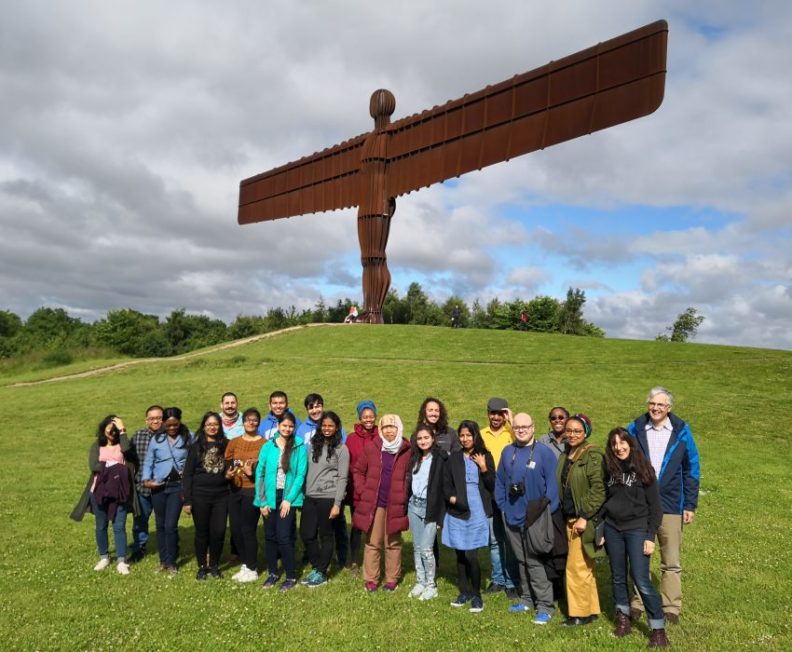Feminism, Ignorance and Wangari Maathai by Boke Omwega

A blog post from Nyaboke Omwega, Postgraduate Research Student, Department of Anthropology and member of the GCRF CDT.
My research on gender discrimination (Transport as Gendered Employment Practice in Kenya) has led me to look at Kenyan history. It is impossible to discuss female leadership in Kenya without discussing Wangari Maathai (1940-2011). Internationally, she was best known for her environmental activism, founding the still active Green Belt Movement – an NGO focused on environmental conservation and best known in Kenya for calling out and preventing attempts at development of public land by key political figures. She was the first African woman to be awarded the Nobel Peace Prize. I have known of her since I had any awareness of key political figures outside of the country’s President and yet, until I did this PhD, I had never thought of her as a feminist.
The Green Belt Movement under her leadership directly challenged patriarchy at the highest levels of Kenyan government. While I explore her work and its implications for women in Kenyan society in my thesis, here, I just want to share my thoughts on why I had previously not thought of her as a feminist.
In my home country of Kenya, we still struggle to reconcile traditional gender roles and expectations with their more modern iterations. Given our strong pride in our culture and traditions, there has been a major lashback against what is still widely perceived as Western ideals of feminism. Women who have been held up as feminist icons and role models can also be noted for their more conservative approaches to feminism and their social acceptability.
Wangari Maathai stood out in stark comparison to many fellow female leaders in her time. Her outspoken advocacy for women’s rights led to divorce from her husband, who famously complained that she was “too educated, too strong, too successful, too stubborn and too hard to control”. It is interesting to note that this complaint resonates with anyone following social media discourses on the curse of the strong woman and also in my own research into the challenges that female engineers in particular face in Kenya and across the world.
Throughout her career, Maathai’s status as a divorced woman was used to dismiss her professionally and personally, despite her qualifications being significantly higher than the vast majority of her male counterparts in the Kenyan parliament. Despite the then president Daniel arap Moi also being divorced, this fact was never used against him in the entirety of his political career, highlighting the gender inequality in perceived social respectability between men and women.
This is also one of the unspoken reasons why she was seldom presented to me as a feminist icon and role model. Heaven forbid I idolise a divorcee who didn’t know how to compromise for her man. It is ironic that she did in fact encourage the reintegration of traditional values, denouncing only those that would limit women’s options and limit their voice in society. Her own experience, where she admitted to having underestimated the pressure that Kenyan men experience to be seen as in charge of the household, had her standing against African and British Colonial traditions that favour men’s power so overtly notably saying:
Nobody warned me – and it had never occurred to me – that in order for us to survive as a couple I should fake failure and deny any of my God-given talents.
(Maathai, W. W. (2006). Unbowed)
Maathai’s activism exposed her to all kinds of harassment and outright assault including being tear-gassed, clubbed unconscious by riot police and death threats. Her work exposed corruption that led all the way to the office of the President himself. Some parliamentarians went so far as to threaten her with female genital mutilation, to which she famously responded:
I’m sick and tired of men who are so incompetent that, every time they feel the heat because women are challenging them, they have to check their genitalia to reassure themselves. I’m not interested in that part of the anatomy. The issues I’m dealing with require the utilisation of the anatomy of whatever lies above the neck. If you don’t have anything there, leave me alone.
J. Mbaria, ‘East Africa Hails Wangari Maathai’s peace prize’, The East African, 11 October 2004
My research into her life and work have led me to admire her call for women to work together to enact change in their communities and country while defining and conforming to their own values. She challenged the current frameworks of empowerment that focused on financial gains, focused instead on issues of voice and the spaces in which African women in particular and all women in general are able to both speak and be heard.
Now that I have seen this example, I can’t unsee it. And I can’t help but wonder who else I am not seeing.
A question to my fellow students: What has your research made you rethink that used to be absolutely normal earlier in your life?

